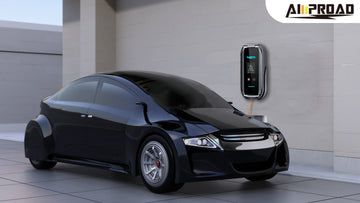
Oil is very important to the development of society, but it is a non-renewable resource, so people must to develop the new engry, for it is a renewable rescouce. Vehicles as a important part of it, this caused more and more person choose to have an electric vehicle. It's an exciting step towards a cleaner future! But with a new technology comes new questions. One of the biggest concerns for many is charging – how long does it take, how much does it cost, and where can I find stations? Don't worry, we've got you covered! This guide will answer your most common questions about electric vehicle charging, so you can feel confident and informed on your EV journey.
Common Question about Electric Vehicle Charging
The followings are the common question about electric vehicle charging:
Question 1: Can I plug my electric vehilce into a regular outlet?
Yes, Level 1 ev charger can be plugged into a regular household outlet at 120 volts because they don't use that much power, charging time need more about 15 hours. But level 2 ev charger require the installation of a 240 volts outlet. Now most people prefer to have home ev charging stations because it will be more convenient and cost-saved.
Question 2: How do EV charger work?
EV chargers play a vital role in replenishing electric vehicle (EV) batteries, ensuring they are ready for the road. There are two main types: level 1 EV chargers and level 2 EV chargers. Level 1 chargers are typically used with standard 120V outlets found in homes, providing a convenient way to charge EVs overnight. On the other hand, level 2 EV charger utilizes higher voltage 240V outlets, offering faster charging times and often found in public charging stations or installed at homes with dedicated EV charging setups. Despite their differences in voltage, both types of chargers function similarly by transferring electricity from the power source to the vehicle's battery. This process is akin to charging a phone, where power flows from the outlet through the charging cable to replenish the battery. Overall, EV chargers play a crucial role in supporting the widespread adoption of electric vehicles by providing efficient and convenient charging solutions for drivers.
Question 3: Can I let an ev charging stations work overnight?
Yes, it is entirely safe to leave electric vehicle charging stations to operate overnight. Electric cars are equipped with systems to prevent overcharging, eliminating the need for constant monitoring while charging. Therefore, you can confidently plug in your vehicle at night, whether using an AMPROAD level 1 or level 2 dual-use EV charger, and trust that it will safely manage the charging process without any risk of damage to the battery.
Question 4: Can I used Tesla wall mount connector to charge other brand cars
No, you can't. In the U.S., there are two primary types of EV chargers: Tesla and Non-Tesla. If you wish to use a non-Tesla EV charger to charge Tesla vehicles or vice versa, you'll need a J1772 to Tesla adapter. Additionally, Tesla offers its proprietary charging solutions, including Tesla destination charger and Supercharger. While Tesla destination chargers are typically found at hotels, restaurants, and other destinations, Superchargers are fast-charging stations strategically located along highways for convenient long-distance travel. However, these Tesla-specific chargers are not compatible with non-Tesla vehicles without adapters. Therefore, it's essential for EV owners to have the appropriate adapters on hand to ensure compatibility when using different charging networks.
Question 5: How to find public electric vehicle charging station?
Making the switch to an electric vehicle (EV) is a fantastic decision for the environment! But with a new car comes the question: where can I charge it on the go? Luckily, finding public EV charging stations is easier than ever. Here are a few ways to locate them:
- Smartphone Apps: Numerous apps specialize in locating EV charging stations. Popular options include PlugShare, ChargePoint, and EVgo. These apps display EVCS locations, availability, charger types, and even user reviews.
- Navigation Systems: Many modern car navigation systems come pre-loaded with EV charging station information. Simply enter "EV charging" or a similar keyword to find stations near you.
- Websites & Online Maps: Several websites and online mapping services, like Google Maps, allow you to filter for EV charging stations. This is a great option for trip planning or finding stations in unfamiliar areas.
- Car Manufacturer Websites: Many car manufacturers maintain lists of compatible charging stations on their websites. This can be a helpful resource if you're unsure which stations work with your specific EV model.
Question 6: Do i claim ev charger tax credit?
Yes, you can claim EVSE charger tax credit in United States. The government is support citizens to buy electric vehicles, so there are discount for the ev chargers.
Question 7: What is the famous ev charger stations in U.S.?
There are many famous ev charger stations opertors in U.S, such as Tesla, Dodge, Chargepoint,Flo, VEVOR,Amproad and so on
Question 8: Can I install ev car charging station at home by myself?
No, please do not to install ev car charging station at home by yourself. Unless your installation is the level 1 ev charger, which features easy-to-do installation ,just to plug into your common outlets. If you need to install level 2 ev charger, it's best to hire an electrician to help you, which will be safety.
Question 9: What’s ev charger types?
There are 3 types, level 1 ev charger also called by slow ev charger, level 2 ev charger named by home ev charger, level 3 ev charger also know as super ev charger.
Question 10: How much do ev charger cost ?
This is based on which ev charger to choose, the price is from 100 usd to 1000usd. Amproad iFlow P9 EV charger just cost 359.99usd and with free shipping.


